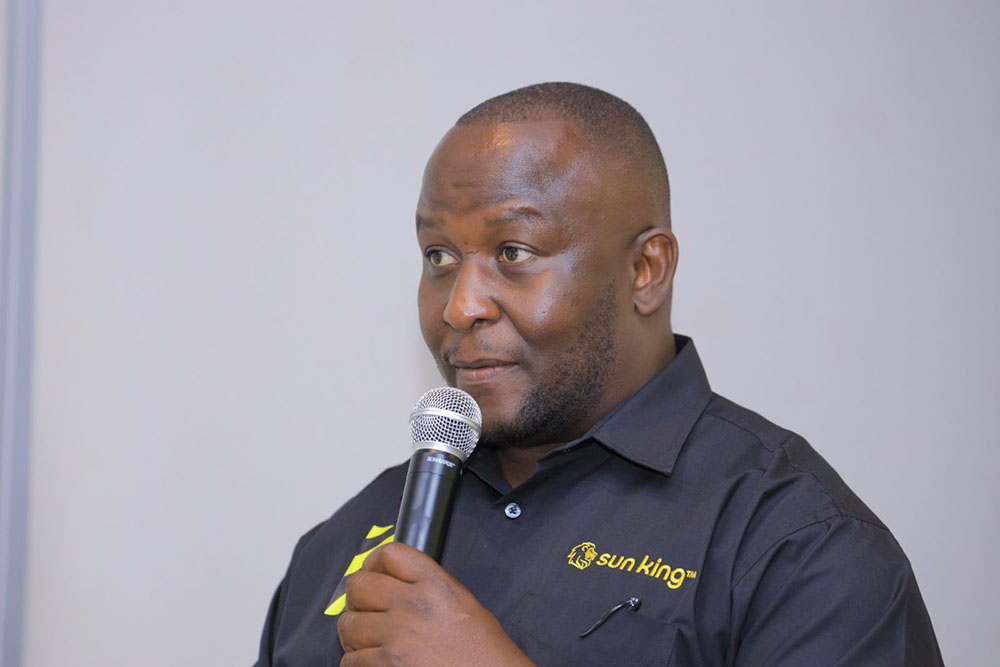Why solar dealers are calling for tax relief on importation of inputs
Uganda has committed to achieving universal energy access by 2040, and solar is seen as a key player in reaching off-grid communities. However, stakeholders argue that current tax policies are working against that goal.
Marianne Arigye, the head of marketing at Sun King Uganda, said the company has been in business for 15 years, and it was time to evolve with its customers. (Courtesy Photo)
As Uganda pushes to expand access to clean and affordable energy, solar energy companies are urging the Government to reduce taxes on the importation of solar inputs.
The dealers say this, would improve growth, innovation and access, especially for low-income households.
“Yes, we want to pay taxes,” Peter Mugwanya, Country Business Leader of Sunking Uganda, says.
“But we also want to run a sustainable business. The high taxes on solar inputs are a big challenge, and we need to have a conversation with the Government to ease the pressure on our operations.”
Despite the growth and potential of the sector, Mugwanya warned that import taxes on key solar components, such as batteries, panels, inverters and controllers, are contributing to higher retail prices, placing solar energy out of reach for many rural households.
“We operate on a prepaid model to make solar more accessible, where a customer pays about 5% upfront and continues with weekly payments,” he said, while speaking during the launch of SunKing's refreshed brand identity at Four Points in Kampala on Friday, September 5, 2025.
“But the more expensive the product becomes due to import duties, the harder it is for ordinary Ugandans to afford solar.”
Tax policies curtailing dream
Uganda has committed to achieving universal energy access by 2040, and solar is seen as a key player in reaching off-grid communities. However, stakeholders argue that current tax policies are working against that goal.
“We are helping fill the gap where the national grid hasn’t reached,” Mugwanya said. “But with every increase in cost due to taxation, our ability to reach that last-mile customer weakens.”
The solar industry globally relies on imported technology and components. He believes that incentivising imports through tax exemptions or reductions could boost adoption, create jobs, and support the government’s rural electrification goals.
Peter Mugwanya, Country Business Leader of Sunking Uganda, says the solar industry globally relies on imported technology and components. He believes that incentivizing imports through tax exemptions or reductions could boost adoption, create jobs, and support the government’s rural electrification goals. This was during the launch of SunKing's refreshed brand identity at Four Points in Kampala on Friday. (Courtesy Photo)
Mugwanya also stressed the importance of public-private dialogue, calling on government to work with solar players to create a policy environment that fosters growth.
“We are not asking for blanket exemptions—we’re asking for sensible policies that recognise the value solar brings to Uganda,” he noted. “With the right support, we can reach more people, faster, and help the country meet its clean energy targets.”
He further pointed out that solar energy is not just an alternative—it’s a necessity in many parts of Uganda where extending the national grid is not financially or technically feasible in the short term.
Marianne Arigye, the head of marketing at Sun King Uganda, said the company has been in business for 15 years, and it was time to evolve with its customers.
“The logo has been updated to reflect a more contemporary, forward-looking brand that resonates with our evolving customer base,” she said.
She noted that the refresh is about more than visuals. The new campaign, dubbed “Switch to More”, aims to educate customers about an expanded product range, including inverters, fans, mobile phones, and systems powerful enough to support schools and health centers.
“The campaign isn’t just about the logo,” Arigye said. “It’s about showing customers what more solar can offer their homes, schools, and businesses.”
Nico Francou, the director of Popo Africa, said for the past three years, Popo has partnered with Sun King to bring reliable solar home systems to remote regions of Uganda. Through this partnership, the company successfully executed a GIZ-funded programme under PSFU, distributing over 1,000 Sun King systems to underserved communities.
He explained that anything they distribute must be reliable.
“We operate in very remote areas—we can't afford to be called back every week for breakdowns,” he said, praising Sun King’s customer support and in-country stock availability, noting that distributors can access “from one to a thousand units”.
“If there’s any issue, their service center responds immediately. The customer is never left in the dark,” he said.